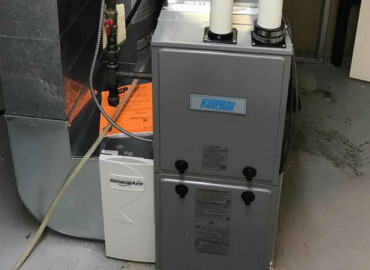Portable vs. Window Air Conditioners: Which is the Best Choice for Your Home?
As the summer months approach, many homeowners begin to consider how they will beat the heat. One of the most popular ways to keep a home cool is with an air conditioning unit. However, with so many options on the market, it can be difficult to decide which type of air conditioner is the best choice for your home. In this article, we will compare portable and window air conditioners to help you make an informed decision about which type of unit is right for you.
Understanding the Differences Between Portable and Window Air Conditioners
Before we dive into the advantages and disadvantages of each type of air conditioner, it’s important to understand the basic differences between portable and window units. Portable air conditioners are standalone units that can be moved from room to room. They typically have a vent hose that must be connected to a window to remove hot air from the room. Window air conditioners, on the other hand, are installed directly into a window or wall and do not require a vent hose.
Advantages and Disadvantages of Portable Air Conditioners
Portable air conditioners offer several advantages over window units. First and foremost, they are highly mobile, making them a great choice for renters or anyone who wants the flexibility to move their air conditioner from room to room. They are also easy to install, requiring only a window or other opening to vent the hot air out of the room.
However, there are also some disadvantages to portable air conditioners. One of the biggest drawbacks is their energy efficiency. Portable units are often less efficient than window units, meaning they may use more energy to cool the same size room. They can also be quite loud, as the compressor and fan are housed in the same unit.
Another potential disadvantage of portable air conditioners is their maintenance requirements. Because they have a vent hose that must be connected to a window, they require more frequent cleaning to prevent blockages and ensure proper airflow. Additionally, the water that is collected during the cooling process must be emptied regularly to prevent the unit from overflowing.
Advantages and Disadvantages of Window Air Conditioners
Window air conditioners also offer several advantages over portable units. One of the biggest advantages is their energy efficiency. Window units are often more efficient than portable units, meaning they can cool the same size room using less energy. They are also typically quieter than portable units, as the compressor and fan are located outside of the room being cooled.
However, there are also some disadvantages to window air conditioners. One major drawback is that they are not very mobile. Once installed, they cannot be easily moved from room to room. Additionally, they can be more difficult to install than portable units, as they require a window or wall opening that is the right size for the unit.
Factors to Consider When Choosing Between Portable and Window Air Conditioners
When deciding between a portable and window air conditioner, there are several factors to consider. The first and most important factor is the size of the room you want to cool. Portable units are generally best for smaller rooms, while window units are more effective at cooling larger spaces.
Another factor to consider is energy efficiency. If you are concerned about your energy bill or are looking for a more environmentally friendly option, a window unit may be the better choice. However, if you value mobility and flexibility, a portable unit may be the way to go.
Finally, you should consider your budget and maintenance requirements. Portable units are often less expensive upfront, but may require more frequent maintenance and may use more energy over time. Window units are generally more expensive upfront, but may require less maintenance and use less energy over time.
Energy Efficiency of Portable and Window Air Conditioners
As mentioned earlier, energy efficiency is an important factor to consider when choosing between a portable and a window air conditioner. While both types of units are designed to cool a room, they do so in different ways that can affect their energy efficiency.
Portable air conditioners typically use more energy than window units, as they must work harder to cool a room while also venting hot air outside. Additionally, because the compressor and fan are housed in the same unit, they can create more heat in the room they are cooling.
Window air conditioners, on the other hand, are designed to be more energy efficient. They are often rated by their Energy Efficiency Ratio (EER), which measures their cooling output per unit of energy consumed. Higher EER ratings indicate a more efficient unit.
Maintenance Requirements of Portable and Window Air Conditioners
Both portable and window air conditioners require regular maintenance to operate at their best. Portable units require more frequent maintenance, as they have a vent hose that must be cleaned regularly to prevent blockages and ensure proper airflow. Additionally, the water that is collected during the cooling process must be emptied regularly to prevent the unit from overflowing.
Window units require less maintenance than portable units, as they do not have a vent hose that can become blocked. However, they still require regular cleaning to remove dust and debris from the filter and other components.
Cost Comparison Between Portable and Window Air Conditioners
When it comes to cost, portable air conditioners are generally less expensive than window units. However, they may end up costing more over time due to their lower energy efficiency and more frequent maintenance requirements.
Window air conditioners are generally more expensive upfront, but may save you money in the long run due to their higher energy efficiency and lower maintenance requirements. Additionally, because they are designed to be installed in a window or wall, they can be a more permanent solution to your cooling needs.
Installation and Mobility of Portable and Window Air Conditioners
Another important factor to consider when choosing between a portable and window air conditioner is installation and mobility. Portable units are typically very easy to install, requiring only a window or other opening to vent the hot air out of the room. They are also highly mobile, making them a great choice for renters or anyone who wants the flexibility to move their air conditioner from room to room.
Window units, on the other hand, can be more difficult to install, as they require a window or wall opening that is the right size for the unit. However, once installed, they are a more permanent solution to your cooling needs and do not require any additional setup or maintenance.
Conclusion
When it comes to choosing between a portable and window air conditioner, there is no one-size-fits-all answer. Both types of units have their advantages and disadvantages, and the best choice for your home will depend on your specific needs and preferences. Consider factors like room size, energy efficiency, maintenance requirements, cost, and mobility when making your decision.
Whatever type of air conditioner you choose, be sure to follow the manufacturer’s instructions for installation and maintenance to ensure that it operates at its best. With the right unit and proper care, you can stay cool and comfortable all summer long.
If you are facing issues with your AC, Smile HVAC will help you repair your AC in Toronto.



